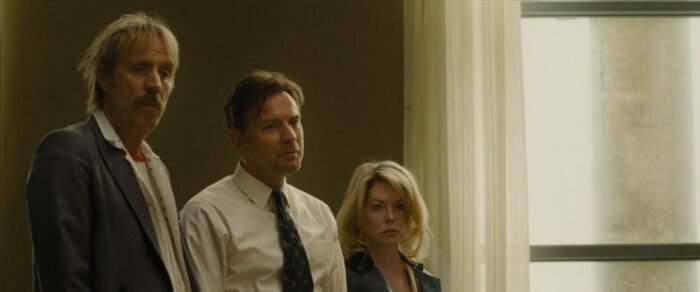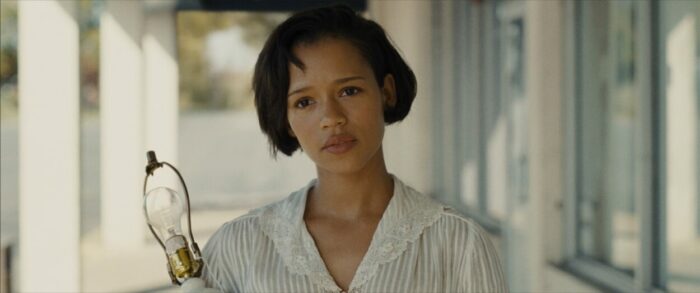Mother, Couch, the debut feature film from Swedish director Niclas Larsson, has a lot going for it. Start with its delightful cast: Ewan McGregor, Lake Bell, Rhys Ifans, Taylor Russell, and Academy Award winners F. Murray Abraham (in a double role!) and Ellen Burstyn. The film has a clever conceit that pins the cast’s characters together in a single location with all kinds of metaphorical and visual potential. Director Larsson has both a distinct visual design and adroit comic timing. And the film’s thematic intentions are, if less than fully realized, promising. Oddly, the sum of these perfectly credible parts ends up a limp mishmash of ideas when Mother, Couch‘s dry comedy takes an odd last-act turn towards the serious and surreal.
Much of the film’s first two acts is sure to delight, as the setting and cast complement each other perfectly. McGregor is the put-upon dutiful adult son, David, in care of his mother (Burstyn). At an antiquated furniture store with his hapless older brother Gruffudd (Ifans), they find themselves in a predicament: Mother (that is how she is addressed, never by name) won’t get up from the display couch she has settled in. She has the bullish temperament of a willful terrier refusing to yield. What to do? Call hot-headed, foul-mouthed sister Linda (Boyle), whose suggestion—apparently in any predicament—is to call 911. David, meanwhile, is distracted by his parental duties, as he’s promised his wife Anne (Bell) to take their daughter Bree to the beach.

There is a surprising bit of humor that can be wrought from the situation: an aged woman refusing to move from a furniture’s display couch. The actors cast as the dysfunctional family make the most of their oppositional characterizations. They remind, though they are less zany, of the Bluths in Arrested Development: there’s a dutiful son, a hapless brother, a shallow sister, and a demanding matriarch. McGregor in particular seems to be channeling Jason Bateman in this role as the beleaguered, good-willed everyman in over his head trying to keep everyone happy. Viewers might even see in the two a neat physical resemblance in their middle age (McGregor is 53, Bateman 55).
The set design also offers up a clever trick. Though the store is antiquated, it’s employing a design ethos borrowed from Ikea, with full rooms mimicking not only living rooms, but bedrooms, kitchens, and bathrooms all functional. These are all partial, open to each other, and the characters wander in and out, the store itself serving as an ersatz version of a family home, with doorways and frames enclosing and isolating figures. The set design also offers an opportunity for McGregor’s David to stay the night with his mother, since the store offers a bed, shower, and kitchen.

It’s the store owner’s daughter and apparently sole employee, Bella (Taylor Russell), who makes the generous offer. It’s one David, of course, misreads as physical attraction, though the role of Bella seems so oddly written that she borders on “magical Negro” territory, with no motivations of her own and existing only to help the white lead character progress toward self-actualization. Abraham plays her father and his brother in a dual role that is at least thankfully not reminiscent of his apparently too-close-to-the-bone White Lotus character. Burstyn, meanwhile, is consigned to the display couch and hidden behind huge black sunglasses for most of the film’s first two acts. Cast here in part for her memorable performance in Requiem for a Dream, she has little opportunity to make an impression—except in the sofa from which she will not move.
Although Mother, Couch is adapted from fellow Swede Jerker Virdborg’s book Mamma I Soffa, one wonders if director Larsson simply sensed at some point that the benign physical and familial comedy of the film wasn’t sufficient to sustain a full-length feature. (It’s not.) Somewhere along the way, things take a turn for the surreal and the serious. The corporeal store gives way to a setting more obviously taking place in David’s imagination and the physical shenanigans yield to a traumatic treatise on grief. Clearly, there is a meaningful sentiment expressed as David slowly comes to realize his mother’s—and by extension, his own—mortality, but it’s not one that is motivated by the interactions of characters up to that point.
As a consequence, Mother, Couch finds itself in an uneasy limbo, inhabiting a space that is neither truly comedic nor dramatic. It’s as full of ideas as its setting of a dilapidated furniture store, stuffed with display items arranged in a simulacrum of a family home but not one; in the same way, the film resembles one that uses comic situations to render a meaningfully dramatic conclusion, but it is in actuality nothing of the sort. Its clever conceit and some fine performances yield less than the sum of its parts.



